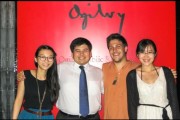The following is Part 1 of a series of articles where we spoke with Michael B. Griffiths, author of ‘Consumers and Individuals in China: Standing out, Fitting in’. Michael is currently Senior Director, Ethnographic Research at Ogilvy & Mather China.
What, in a nutshell, is your book about?
It’s about the fundamental drivers of Chinese people’s behavior and how these are differentiated across different parts of society.
Sounds interesting! What was your most surprising discovery whilst writing the book?
That Chinese are not as different as Western commentators would usually suggest: that they have their own thoughts, individual desires and creative impulses; that they take up positions in relation to one another in fundamentally similar ways to people elsewhere; that they demand to be treated as having personalities even as they seek intimacy and belonging with their fellows; that they may be traditional but they are not ‘bound’ by tradition. That kind of thing.
Who was the most interesting character you encountered over the course of writing and researching the book?
That’s really hard to answer; I met so many interesting people over the course of doing the research: the migrant workers, the consumerist youths, the dissident intellectuals, enterprising farmers and Communist Party cadres – they were all interesting in their own ways. But I suppose if I had to pick just one person it would be my wife!
How many years work is this book a product of?
About six years. I first started working on this in 2005 and I just published it in December last year, so that would be probably about 7 years. I suppose you could say it took 4 years of more or less fulltime work, and then the latter 2 or 3 years were about bringing it to the point of publication point in any “spare time” I could find around my day job. It wouldn’t take me so long now to write a book like this again, but this is my first book so it’s very much the book I had to learn to write books on.
How were the 7 years spent on the book divided up?
There was a lot of time learning about ethnography, learning about China and Chinese; probably a large part of the first three years went on reading other peoples books and that kind of thing. And then once you get to the point of writing your book, although it doesn’t really happen like that, there is linearity, but you also read as well as write, and rewrite as you learn new things. Most of the following 3.5 years were spent writing.
Your writing takes you to places, and you rewrite and rewrite, so I have this folder on my laptop with sub-folders for 2005, 2006, 2007, 2008, and 2009, and within each folder, hundreds of different versions of the evolving manuscript. Early on, the chapter structure and everything was different; there were other chapters that didn’t fully materialize even quite late in the process, even immediately prior to making the submission to the publisher Routledge. I was going to have a methodological appendix at the back but ditched that idea.
So you were writing right up to the deadline?
Oh yes, and even now there are still imperfections in there, commas out of place and so forth. Even after I submitted the manuscript there was a messy process of requesting changes to be made. Writing a book is a busy and dynamic thing; it’s not like there’s ever a totally finished product. It just gets to the point where there are diminishing returns.
Did you work with others in writing this book?
I did nearly all of this totally on my own. I had some oversight over the years from my PhD supervisor and there were a couple of scholarly friends who read parts of it; they are credited at the front of the book. But it’s not like I had a corporation at my fingertips and lots of people to review it and make comments and contribute. Neither is it like people wrote parts of it for me and I stuck my name on it; far from it. That said I could never have done it without the help of people from Anshan, support from one or two key professors, and the various grant awarding bodies who graciously invested their funds in my research.
For many years writing the book was the largest part of what I did. I wrote other papers too, and they’re all in the public realm, but the book was my main thrust and the source of the intellectual exploration for all the other papers. All of my partnerships with academics, universities, presentations at conferences, and so on, came from this; the book was the main thrust of my investigations and almost totally took over my life.
How did life change following completion of the book?
By the time the book was published, it was as if life was fighting back. I remember when I submitted the final PhD thesis for examination; it was more or less exactly the same time as my wife gave birth to our daughter. So, having been a PhD student for 4 years, my priorities began to change. I had to submit the thesis quickly, and then once I started working for Ogilvy & Mather China I had a lot of other projects to work on.
These days I handle clients, design and manage research projects, and the book was something that had to be fitted into evenings and weekends around raising a baby. But as I say, most of the work was actually done quite some time ago now between 2005 and 2009. The last couple of years have really been about trying to get it out there.
How would you describe the overall writing process?
Years ago I used to liken it to combing your hair. In the time when I was actually dynamically engaged in exploring the ideas, teasing them out and exploring them through writing, it was almost like you could feel your mind or brain being combed through the process of drafting. That’s because writing a book is not just about saying something; it’s about saying something at the right place and the right time. It’s one thing to write a 3000 word piece and pop it on the internet, but when you’re writing a solo-authored book comprising 12 chapters, each of which is 10,000 words long, each chapter has to have an internal logic and flow: it has to start somewhere, go to places, make sense and finish somewhere; and not to mention all add up into something that goes beyond its component parts.
I think combing is a good metaphor because there’s so much material to deal with; there are so many different areas you can take your analysis into that towards the end the process becomes increasingly about deleting and taking things out and focusing down. The PhD thesis for example was quite a bit longer than the book; it was around 130,000 words long, whereas the book is just over 110,000. So you can imagine a lot of material was chopped out.
Are you happy with it?
Of course! But I’m also relieved. People say ‘You must be so proud?’, but it’s really not like that. Publishing a book isn’t like going out and buying a Hugo Boss shirt to stick to your chest. It’s a real labor of love, and if you’re 25 when you start and you’re 33 when it’s done, you’re bloody well glad it’s over! You’re relieved. I never want to do another one but I probably will … eventually. But you know when a project is that long, and it occupies that much of your life — it’s twice as long as your standard university undergraduate course — we’re talking about a big section of your life. But feeling happy doesn’t quite capture it.
“We have a habit of divine discontent with our performance. It is an antidote to smugness.” – David Ogilvy
David Ogilvy talked about “Divine discontent” and I understand this. No one would complete something like this if they didn’t understand what divine discontent really means. When you do something this long and frankly speaking that difficult you go way past feeling like you don’t want to do it anymore and hating it, but you do it because you love it and are compelled to. It’s the almost insane pursuit of a goal, to the exclusion of all else.
Take the philosopher Immanuel Kant. Kant wrote one of the most influential books ever written, ‘The Critique of Pure Reason’. Kant was already a talented philosopher at the time but when he realized he wanted to embark on this enquiry he wrote to all his friends telling them he was going to lock himself away while he wrote this book. You might think it sounds crazy, but Kant locked himself up for ten years and came out with this paradigm shifting text that provided the philosophical underpinnings for the foundations of modernity.
Writing my book was a bit like this. I don’t mean that my contribution is parallel to Kant’s, obviously! I mean it was about divine discontent. You pursue it because it’s a love, but you sometimes hate it as well. Sometimes I have likened it to a marriage. You’ve got to stick by it because you’ve invested so much of yourself in it. But it’s never really finished. Even now there are parts I am not totally content with, areas which I would change now.
Now that it’s out there in the public, the book seems so small in size! In a way I was quite pleased with that, since it sort of fits in your hand. But it does seem strange that I spent all that time on this small-sized book! As I said, an awful lot of time went on learning Chinese and doing the fieldwork, so it’s not like it took a full 7 years to just write the book. It took several years of analysis to get to the point where I could write the book.
 Michael Griffiths’ book, “Consumers and Individuals in China: Standing out, Fitting in” can be ordered at bookstores worldwide, as well as via online book sellers.
Michael Griffiths’ book, “Consumers and Individuals in China: Standing out, Fitting in” can be ordered at bookstores worldwide, as well as via online book sellers.
The book appeals to sociologists, anthropologists, and China Studies generalists. Marketers and communications professionals working in China appreciate the book’s deep insights into how Chinese consumers’ fundamental motivations are structured and differentiated.
The publisher, Routledge, have kindly offered a 20% discount on all purchases made using the discount code GDC72 at the relevant webpage.
End of Part 1








